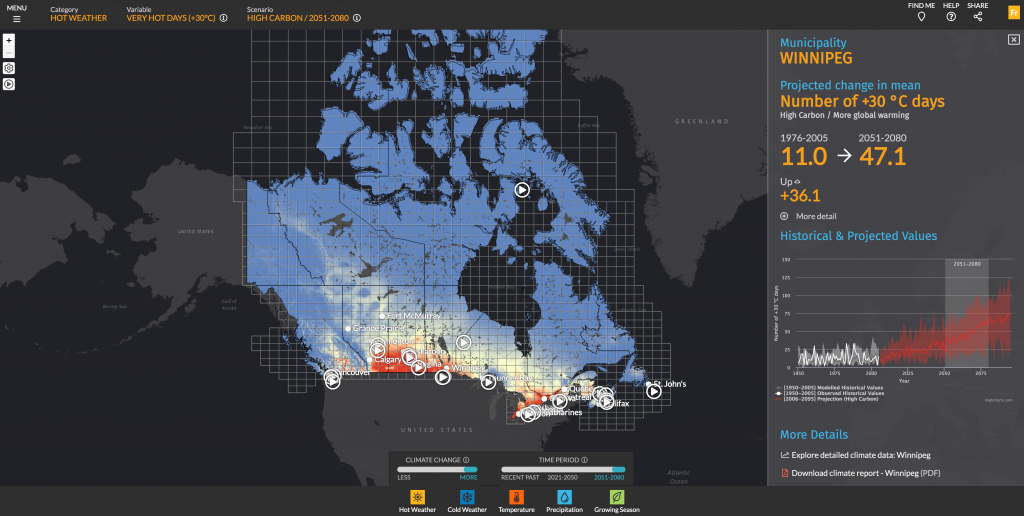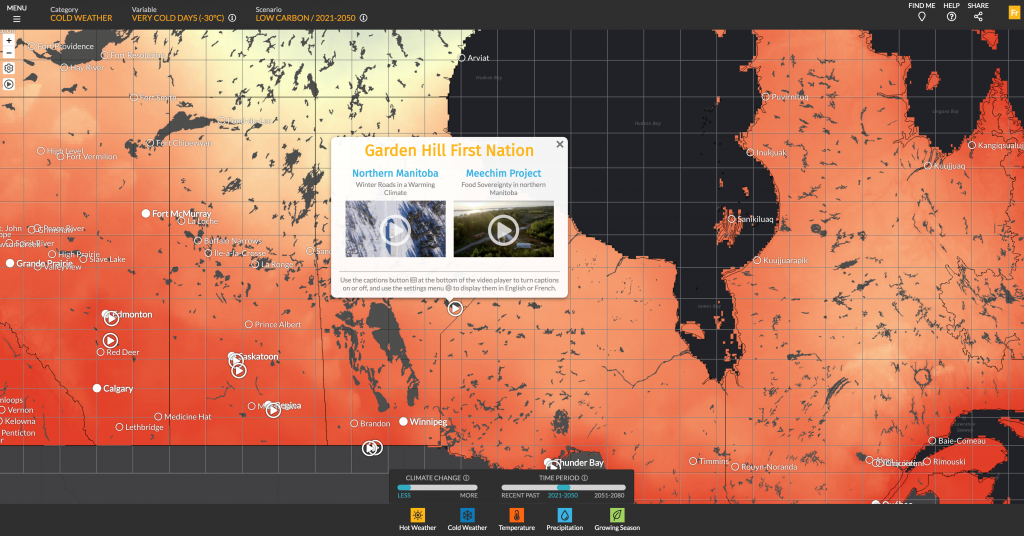Summary:
The Prairie Climate Centre at the University of Winnipeg is an outstanding example of Knowledge Mobilization. It is committed to making climate change meaningful and relevant to Canadians from all walks of life. It brings an evidence-based perspective to communicating the science, impacts, and risks of climate change through high-quality maps, documentary video, research reports, and plain-language training, writing, and outreach. The Centre has two Co-Directors: Dr. Danny Blair and Dr. Ian Mauro, both from the Department of Geography. Blair is a climatologist, and Mauro is a documentary film maker and environmental scientist (and also the Principal of UWinnipeg’s Richardson College for the Environment).
Project:
The Prairie Climate Centre’s goal is to inspire citizen participation, to support communities in making meaningful and effective adaptation and mitigation decisions for current and future generations, and to help Canadian society move from risk to resilience.
The flagship project of the PCC is the Climate Atlas of Canada (www.climateatlas.ca). It combines climate, cinema, and cartography to bring the global issue of climate change closer to home, and is designed to inspire local, regional, and national action and solutions.
The Climate Atlas is truly a game-changer in the mobilization of knowledge about climate change. Canadians now have access to meaningful climate data, tailored and visualized for about 1,900 regions, cities and towns across the country. The PCC has also co-created 24 videos – based on over 300 interviews across Canada – about impacts, hope and resilience across the landscape. The Atlas innovatively brings this science and storytelling together in a tool that is unique in the world. And it’s completely bilingual.
The Atlas was launched in Toronto on April 4, 2018, with the Honourable Catherine McKenna (Minister of Environment and Climate Change Canada) and print, broadcast and social media reported extensively on the project. According to Meltwater, a global leader in media monitoring, in the 3-week period after launch media coverage reached a potential audience of 80 million people globally!
Making this kind of impact is only possible with an incredible team and enthusiastic supporters. The PCC extends its thanks to its staff and student researchers, the University of Winnipeg, and the International Institute for Sustainable Development (IISD) for contributing to our foundation and success as an organization. It is also grateful to its funders, including Environment and Climate Change Canada, the Government of Manitoba, the Social Sciences and Humanities Research Council, Great West Life, and Health Canada.
Links:
Prairie Climate Centre Website: http://prairieclimatecentre.ca/
Climate Atlas of Canada: https://climateatlas.ca/
Climate Atlas Videos on YouTube: https://tinyurl.com/y74orb8z
Prairie Climate Centre Team: http://prairieclimatecentre.ca/about-us/
Figures:

The Climate Atlas of Canada provides all Canadians with localized climate change information. Climate model data, for dozens of variables, is available for about 1,400 grid squares and almost 500 towns and cities. Data is provided for two 30-year periods and two carbon emission scenarios. The site is mobile/tablet friendly, and bilingual. The Atlas uses data from 12 climate models, provided by the Pacific Climate Impacts Consortium (PCIC) at the University of Victoria.

One of the most unique and exciting aspects of the Atlas is that embedded within it are many high-quality documentary videos in which Canadians from all parts of the country and from all walks of life discuss their experiences and responses to climate change. In doing so, Climate, Cinema, and Cartography come together to inspire citizens and policy-makers to take actions that will make our communities more healthy, prosperous, sustainable, and resilient.